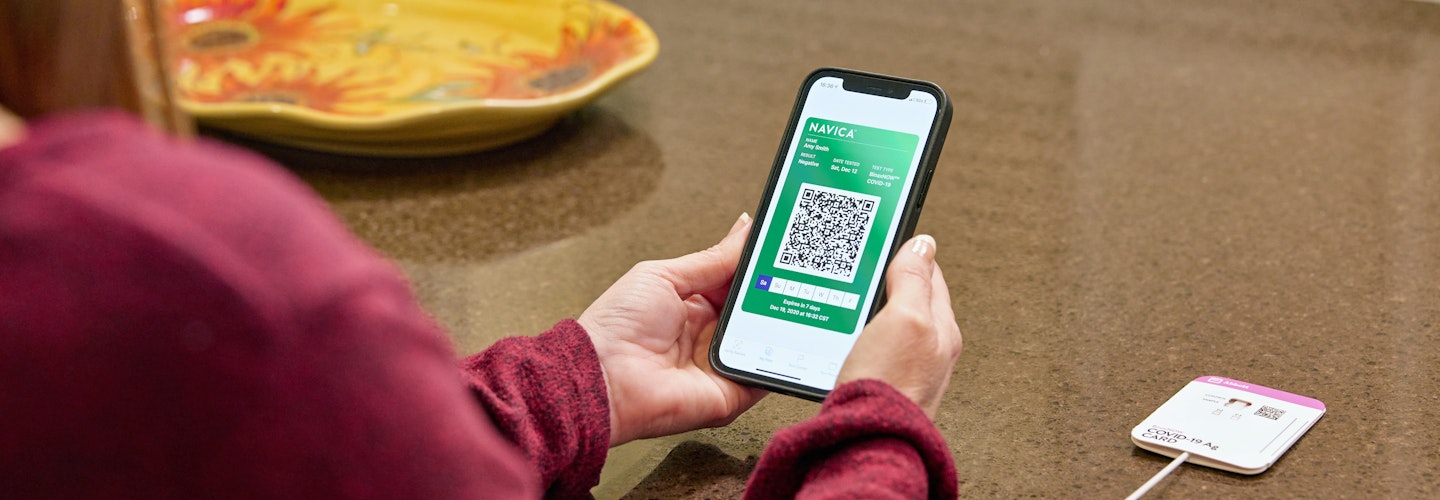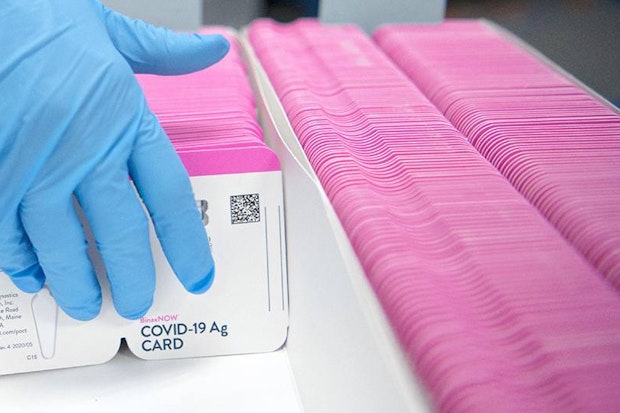
By Andrea Wainer, Executive Vice President, Rapid and Molecular Diagnostics, Abbott
Over the past year, we’ve seen profound changes in how people access healthcare, from virtual doctor appointments to drive-thru vaccinations and at-home testing. While these methods of care existed before the pandemic, COVID-19 created an unprecedented need for extensive decentralized access to care and rapidly accelerated this shift.
Public health, not just any one individual’s own personal health, has become increasingly important to us all, yet many of our systems and widely used methods of care weren’t built to address these needs, let alone a health crisis impacting the whole globe simultaneously.
At Abbott, we acted immediately to bring healthcare closer to communities and people in need. For diagnostics, this started with traditional laboratory tests, but we also worked to bring forward tests that can deliver results quickly and easily, even from the safety of a person’s own home – helping to meet both personal and public health needs.
The pandemic also exposed and exacerbated longstanding, often deeply rooted health disparities, especially in lower-income areas and historically underserved communities in the U.S. and globally. For many, COVID-19 has threatened their livelihood as much as their physical and mental health: working from home or missing a shift to quarantine aren't viable options. Tests need to be affordable and accessible, meeting this moment and the unique needs and challenges of communities around the world.
Traditionally, innovation-driven business has focused on delivering solutions to technical and medical challenges to improve health. But that is only part of the solution-set we need. We also need that same level of innovation in addressing health-related social challenges. That means disrupting the market not only with extraordinary breakthroughs in technology, but also in who those products can reach – because the best healthcare solutions are those that help the greatest number of people.
Addressing social challenges in healthcare must be at the forefront of business-led innovation. It’s a large challenge to take on, but it’s one Abbott is committed to tackling. We are intentionally approaching product development to extend the reach of our products — responsibly applying data insights and designing access and affordability into our life-changing technology. Access, affordability and health equity are fundamental to Abbott’s long-term 2030 Sustainability Plan and our business strategy to democratize, decentralize and digitize testing.
Lessons from COVID-19
When developing COVID-19 tests, we threw out the notion that you can’t have a test that is affordable, reliable and scalable. Our teams quickly got to work — working around the clock, literally 24/7, developing products, working on procurement, supply chain and rapidly increasing our manufacturing capacity — and now we’ve delivered more than 700 million tests globally to date that met all three of these needs.
Abbott’s two rapid antigen tests – BinaxNOW and Panbio – accurately detect people who are infectious and most likely to spread COVID-19, even when they aren’t showing symptoms. The Panbio Ag COVID-19 Test has CE mark, with more than 300 million tests shipped to more than 140 countries. BinaxNOW is the most affordable over-the-counter COVID-19 test in the U.S. and is the most studied rapid antigen test on the market, with proven accuracy for catching infectious people.

With our rapid antigen tests, we proved that affordability, reliability and scalability are possible in diagnostic testing – and now we're working to bring this innovation to people everywhere.
A key part of this work is making testing as easy, convenient and readily available as possible, so we continued to improve our tests and expand their use cases throughout the pandemic. This includes BinaxNOW and Panbio Self Tests for over-the-counter sale, which allows people to purchase the tests from their local retailers and self-administer with ease from the comfort of their own homes.
Innovating for access and equity
It is clear that rapid tests at the point of care improve outcomes for everyone, particularly during a pandemic. And now that patients have experienced widespread access to care in decentralized settings, they will look for more of it. The healthcare industry should lead in response to that need, and we should pursue new and innovative partnerships to meet that bar.
With BinaxNOW and Panbio tests, governments, businesses and organizations are implementing return to work, school and travel programs to bring testing to new settings as the world moves toward recovery. For example, airports in Luanda are using Panbio to screen passengers before they are allowed to board planes for international travel or upon arrival from other countries. In Germany, kindergarten students and staff are using Panbio self-test kits to screen and quickly identify any contagious individuals and reduce the spread of infection. Malawi and Bahrain have been using the test to facilitate return to school, while many organizations from France to South Africa have recently started using Panbio to ensure a safe back to work process for their workforce.
Flexibility to reach people in places where healthcare is typically sparse also remains a critical need — from inner cities to the world’s most remote villages. The Panbio test is easy to use even in the most remote settings, since no instrumentation is required and test turnaround time is 15 minutes. To help advance access to this test, Abbott joined the WHO’s Access to COVID-19 Tools (ACT) Accelerator, which was established in 2020 to make affordable and high-quality rapid antigen tests available to low- and middle-income countries. In the U.S., we recently partnered with Walgreens to expand access to affordable rapid testing in Philadelphia by providing free BinaxNOW Self Tests to people with EBT government assistance program cards, so that low-income residents can access this important COVID-19 tool without concern for cost.
Partnerships like this are an integral part of improving the future of accessible and affordable testing, well beyond the COVID pandemic. There are significant opportunities to expand the use of rapid testing to address many other health challenges. Our tests for infectious diseases like malaria, dengue and HIV, as well as non-infectious health needs like prenatal care are expanding access to essential care globally. And through global partnerships, like our efforts with the Rwandan Ministry of Health and Society for Family Health Rwanda, testing is improving rural healthcare and patient health outcomes.
Access and affordability will be at center stage for both our COVID-19 recovery and our future models of care. Abbott continues to make this a central pillar of our sustainability plan and business strategy – so that together we can help more people live better and healthier lives.
Andrea Wainer is executive vice president of rapid and molecular diagnostics at Abbott. In this position since 2019, she leads two of the company’s businesses that have made a significant contribution to the global battle against COVID-19. She also oversees businesses providing a handheld point-of-care device and an informatics solution provider.
________________________________________
The views and opinions of the author are their own and do not necessarily reflect those of The Aspen Institute.

